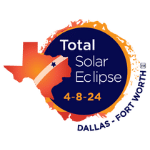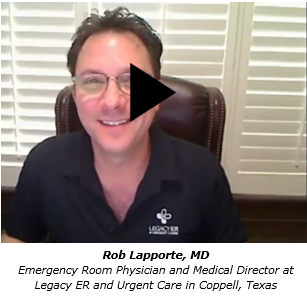Emergency Room Physician and Medical Director at Legacy ER and Urgent Care
As the long-awaited Total Solar Eclipse approaches on April 8, 2024, North Texans and visitors alike are gearing up for an unforgettable celestial spectacle. This rare event, the last total Eclipse visible from the contiguous United States for decades to come, has generated tremendous excitement and anticipation. However, amidst the enthusiasm, it’s crucial to prioritize eye safety to prevent permanent retinal damage. In this blog post, we’ll explore essential tips from Dr. Rob Lapporte, an emergency room physician and Medical Director at Legacy ER and Urgent Care in Coppell, Texas, to ensure a safe and enjoyable Eclipse viewing experience.
Can You Wear Sunglasses To Watch An Eclipse? Do we need to capitalize sunglasses?
Everyone’s first question is often: Will sunglasses be enough? Can I look at a Solar Eclipse with Sunglasses? And the short and very definitive answer is absolutely not. You can’t. For example, put a flashlight behind a pair of Sunglasses and then a flashlight behind a pair of official ISO-rated Solar Eclipse glasses. Unlike the ISO-compliant Eclipse glasses, the Sunglasses don’t block out much (and this is just a flashlight). Even if you stack two or three pairs of Sunglasses, they are unsafe, and you will burn your retina if you look directly at the Sun.
What Type Of Glasses Should You Wear When Watching A Solar Eclipse?
Regarding the glasses that you should get to view a Solar Eclipse, they must be ISO-compliant. Now, be aware that anyone can print anything they want today, so they can print “ISO-compliant glasses” on some glasses that aren’t. I recommend you visit the American Astronomical Society, which has an approved vendor list (https://Eclipse.aas.org/eye-safety/iso-certification). I would only buy from one of those vendors. Given that it is coming up in a month, I would probably get on that immediately if you plan to view the Eclipse because I don’t know if supplies will be short.
What NOT To Do While Wearing Eclipse Glasses.
Speaking as an emergency room physician, I implore you to refrain from trying to put these on and drive or walk around. Just be in one place and know the approximate area. You’ll look up toward the Sun, so put on your Eclipse glasses first and then look up. You mustn’t think you can travel around with these glasses on.
What Makes Solar Eclipse Glasses Safe To View The Sun?
I want to stress the importance of getting ISO-rated glasses when viewing an Eclipse. And just so you realize, when you put these on, you won’t be able to see anything other than the Sun. It is so dark that you won’t be able to see your hand in front of your face. You won’t be able to see a car down the street. You won’t be able to see headlights because the lenses are so dark. And that’s what makes it safe for you to view the Sun.
How Do You Protect Your Eyes While Taking Pictures Of An Eclipse?
Many people also like to photograph the Eclipse. And it’s great fun. I plan on doing it. I did it in 2017 for the last total Eclipse that we had. And then last year, we had a partial and not a total Eclipse. So, I enjoy doing it. If you want to view the Eclipse through a camera, you must also take precautions and get the proper safety equipment, like solar filters explicitly made for cameras. If you use your camera without a solar filter, not only will it burn your retina, but it could also burn the camera sensor.
What Happens If You Look Directly At The Sun?
Often, people think that if you glance at the Sun briefly, it’ll be okay because you don’t feel any pain from it. I want to dispel that myth right away. It’s like if you were at the beach and you got a Sunburn; you don’t always feel the Sunburn right away. Sure, you feel the Sun beating down on you, but it’s not until hours later or the next day that you feel the pain and see all the redness, blisters and damage the Sun caused. The retina of the back of your eye is magnified even more. So don’t think for a second that you can quickly glimpse the Sun during an Eclipse without ISO-compliant Eclipse glasses and be safe. You cannot.
Another thing to realize is that 99% of Totality is not a Total Eclipse. And that tiny little bit of viewable Sun can damage your eyes. Be very careful.
What Is Solar Retinopathy?
Solar retinopathy (also known as Eclipse retinopathy) is the pathology that occurs in the back of your eye after looking at an Eclipse or the Sun without ISO-compliant Eclipse glasses. And it can cause permanent damage. Sometimes, the damage can be minimal and can be self-limited over maybe three to six months. But often, it’s permanent.
How Do You Know If Your Eyes Have Been Damaged By The Sun During A Solar Eclipse?
If one were to develop any damage to the eye from solar retinopathy, they would likely experience a loss of central vision. They may see little floaters in their eyes or feel like there’s almost something in there. This can be a chronic condition.
What Do You Do If Your Eyes Are Damaged By The Sun During A Solar Eclipse?
If you were to experience any of the symptoms, I’ve described that can be caused by solar retinopathy, I would get to an ophthalmologist immediately—not an optometrist, not somebody you go to for your glasses. I would make an appointment with an ophthalmologist as quickly as possible and be evaluated.
Are You Excited To Witness The April 8 Total Solar Eclipse?
I am super stoked about this total Solar Eclipse. I can’t wait. As I mentioned, I’ve got my camera gear and glasses ready. I plan to have a friend from out of town who’s a professional photographer join me. So, we’re very excited to photograph and view this. As I understand it, it’s the last total Eclipse we’ll see in the United States in the next few decades.
The Total Solar Eclipse on April 8, 2024, promises to be a once-in-a-lifetime experience for many, and the Dallas-Fort Worth area is poised to be one of the best locations to witness this extraordinary event. By following the essential safety tips shared by Dr. Rob Lapporte and Total Eclipse DFW, you can ensure that your Eclipse viewing experience is both memorable and safe.
Remember to obtain ISO-compliant, AAS-approved Solar Eclipse glasses from reputable vendors, wear them properly, and supervise children closely. Don’t let the moment’s excitement overshadow the importance of protecting your eyes from permanent damage.
Total Eclipse DFW is committed to helping North Texans and visitors alike prepare for this celestial wonder. As your go-to resource for all things Eclipse-related in the Dallas-Fort Worth area, we encourage you to explore our website for more information, resources, and merchandise. Let’s come together as a community to celebrate this awe-inspiring event while prioritizing the safety and well-being of all. Join us in counting down the days until April 8 when we’ll witness the magic of the Total Solar Eclipse together!
Check out Total Eclipse DFW’s Eclipse merchandise, the Texas Total Solar Eclipse 1-Ounce .999 Fine Silver Commemorative Coin and of course ISO-complaint AAS-approved Eclipse glasses.

